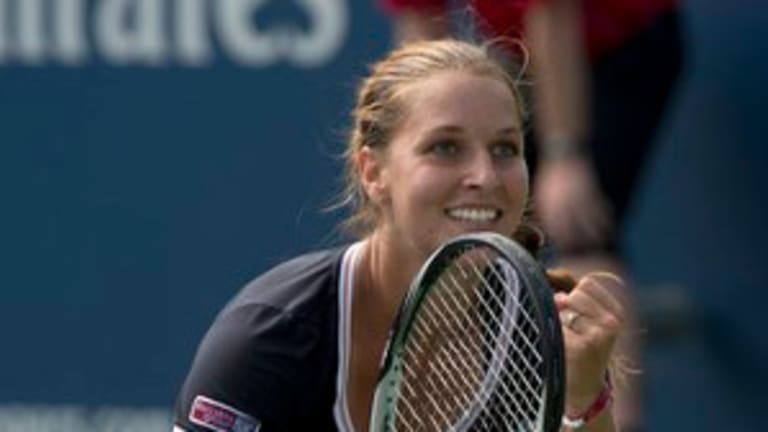Each day this week, Peter Bodo will review action from the Rogers Cup tournaments in Canada and preview upcoming matches. These "Good Morning Canada" posts will be published around 10 am EST, and we encourage you to discuss the day's play—along with Pete's thoughts—in the comment section below.
Yesterday: By the time Denis Istomin, wearing a pair of glasses with banana-yellow frames (borrowed from Redfoo?), won the first set from Novak Djokovic last night in Montreal, exhausted fans in Canada could be forgiven for responding in muted fashion.
After all, most of them had already spent their emotions on what probably is the greatest moment in Canadian tennis history. Oh, if only Ernests Gulbis were from Regina, Sasketchewan, instead of Riga, Latvia!
I say that because Gulbis upset Wimbledon champ and No. 2 seed Andy Murray, a game effort that will be buried on page two of the sports section in Canadian newspapers—because it came on a day in which Milos Raonic upended Juan Martin del Potro, one of the most menacing contenders on hard courts anywhere in the world, and his countryman Vasek Pospisil edged out Tomas Berdych in a heart-and-gut wrenching third-set tiebreaker, 7-5, 2-6, 7-6 (5).
Canada hasn’t plopped two men into the quarterfinals of its home tournament since 1989, before either Raonic or Pospisil was born. That pair was Grant Connell (career-high ranking: No. 67) and Andrew Sznajder (career-high No. 46), who were then summarily dismissed by Ivan Lendl and Andre Agassi, respectively. But given that Raonic is a Top 10-level player, this has to rank as a more resonant moment in the development of Canadian tennis.
Wasn’t it just a few days ago that in this space I gently needled our northern neighbors by pointing out that seven of the 10 Canadians in the Montreal and Toronto (WTA) draws slipped in clutching wild cards? (Raonic earned his way in, and is seeded No. 11.) In truth, the Canadians responded to the home-nation perks beautifully; the only first-round losers in the bunch were Carol Zhao, Stephanie Dubois, who had to play fellow Canadian Sharon Fischman, and—ironically—a man who fought his way through qualifying, Peter Polansky.
The bigger of yesterday's upsets was Raonic’s, even if Pospisil’s battle with Berdych was the tougher, tigher, more riveting match. It’s unfortunate that Raonic's win was marred by a controversy over his ethics, after he failed to volunteer that his feet touched the net after hitting a ball but before a point was over—which is a violation of the rules. (For more, read Steve Tignor's Racquet Reaction to the match.)
My own feeling is that the call was the chair umpire’s to make, and while it would have been sporting for Raonic to give up the point, he’s a 22-year-old who probably was so caught up in the moment that he wasn’t really thinking straight, or perhaps not thinking at all, and certainly not thinking about the finer points in the rule book. I’d bet dollars to donuts that if the situation were presented to him under less stressful circumstances, he would have chosen to give up the point without giving it a second thought.
Raonic crossed some sort of psychological Rubicon when, after brushing the net, he looked at umpire Mohammed Lahyani—and got no feedback whatsover. You don’t become No. 13 in the world without having accepted the basic code of ethics that demands that you to fess up when you know you’ve made a mistake, but you also don’t climb that high on the vine by sweating the small stuff. This morning, Raonic will wish he’d given del Potro the point. And in the long run, the distraction may really hurt him (and you know it won’t go away overnight, not with the jaws of the press locked onto it).
Raonic has had big wins before; what made this such a special day was Pospisil’s contribution. Ranked No. 71 and never before within shouting distance of a Masters 1000 quarterfinal, he said: “To have my first Top 10 win here, in front of that crowd, was extremely emotional. I was having difficulty controlling it.”
Things weren’t quite as electric over in Toronto, where the women produced only one less-than-ground-quaking upset—Dominika Cibulkova’s thrashing of a vulnerable No. 10 seed, Roberta Vinci. In fact, only one of yesterday's eight WTA matches went to three sets, but that one was a corker. No. 4 seed Li Na, who lives by the dictum that you should never do things the easy way when a much more difficult way is available, survived a threat from No. 16 Ana Ivanovic to win 7-6 (5) in the third. Li was down 2-5 in the third, and that kind of thing happens so often with her that I can’t help but wonder if she wasn’t thinking, “Okay, I’ve got her right where I want her. . .”
Also worth mentioning is that Wimbledon champ and No. 7 seed Marion Bartoli suffered a severe abdominal strain and had to quit her match with Magdelena Rybarikova, the young Slovak who won Washington last week and is close to her career-high ranking at No. 42.
Last but not least: Top-seed Serena Williams demolished Kirsten Flipkens, 6-0, 6-3.
*
